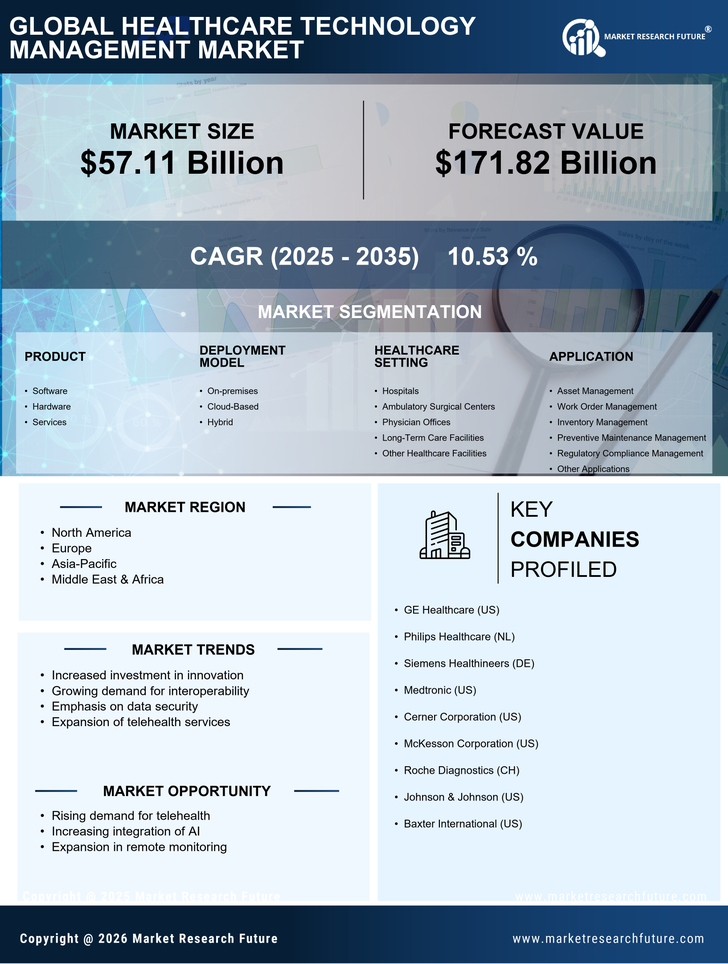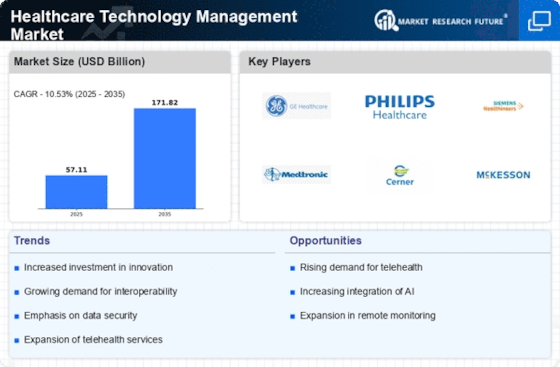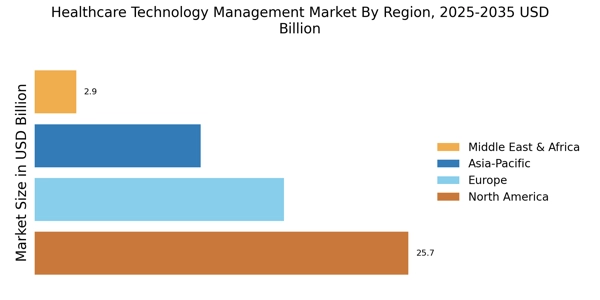Focus on Patient-Centric Care
The shift towards patient-centric care is a pivotal driver of the Healthcare Technology Management Market. Healthcare providers are increasingly recognizing the importance of tailoring services to meet individual patient needs, which necessitates the adoption of advanced technology solutions. This focus on personalized care is supported by data indicating that patient engagement can lead to improved health outcomes and reduced hospital readmissions. As a result, healthcare organizations are investing in technologies that facilitate better communication, data sharing, and patient involvement in their care processes. The Healthcare Technology Management Market plays a crucial role in enabling these transformations by providing the necessary tools and frameworks to support patient-centric initiatives. This trend is likely to continue as healthcare systems evolve to prioritize the patient experience.
Regulatory Compliance and Standards
Regulatory compliance and adherence to standards are crucial factors influencing the Healthcare Technology Management Market. As healthcare regulations evolve, organizations are compelled to adopt technologies that ensure compliance with safety and quality standards. The implementation of stringent regulations, such as those related to data privacy and patient safety, drives the need for robust technology management solutions. For instance, the Health Insurance Portability and Accountability Act (HIPAA) mandates strict data protection measures, prompting healthcare providers to invest in technology that safeguards patient information. This regulatory landscape not only fosters trust among patients but also enhances operational efficiency, thereby contributing to the growth of the Healthcare Technology Management Market. Organizations that prioritize compliance are likely to gain a competitive edge in an increasingly regulated environment.
Increased Investment in Healthcare IT
Increased investment in healthcare IT is a significant driver of the Healthcare Technology Management Market. As healthcare organizations recognize the potential of technology to enhance operational efficiency and patient care, funding for IT solutions is on the rise. Recent reports suggest that healthcare IT spending is expected to grow substantially, reflecting a commitment to digital transformation. This influx of investment is likely to lead to the development of innovative technologies that address various challenges within the healthcare sector. Furthermore, as organizations seek to improve interoperability and data management, the demand for comprehensive technology management solutions will likely increase. The Healthcare Technology Management Market is thus positioned to benefit from this trend, as stakeholders prioritize investments that enhance their technological capabilities.
Technological Advancements in Medical Devices
Technological advancements in medical devices are significantly shaping the Healthcare Technology Management Market. Innovations such as wearable health monitors, telemedicine platforms, and advanced imaging technologies are transforming patient care and management. The market for medical devices is expected to expand rapidly, with projections indicating substantial growth in the coming years. These advancements not only improve diagnostic accuracy but also facilitate remote patient monitoring, thereby enhancing the overall efficiency of healthcare delivery. As healthcare providers seek to leverage these technologies, the demand for effective management solutions that can integrate and optimize these devices becomes paramount. This trend underscores the importance of the Healthcare Technology Management Market in ensuring that healthcare organizations can effectively harness the potential of emerging technologies.
Rising Demand for Efficient Healthcare Solutions
The increasing demand for efficient healthcare solutions is a primary driver of the Healthcare Technology Management Market. As healthcare systems strive to enhance patient outcomes while reducing costs, the adoption of advanced technologies becomes imperative. According to recent data, healthcare expenditures are projected to reach trillions, necessitating the integration of technology to streamline operations. This trend indicates a shift towards more efficient management of healthcare resources, which is likely to propel the growth of the Healthcare Technology Management Market. Stakeholders are increasingly recognizing the value of technology in optimizing workflows, improving patient care, and ensuring compliance with regulatory standards. Consequently, the market is witnessing a surge in investments aimed at developing innovative solutions that address these challenges.


















